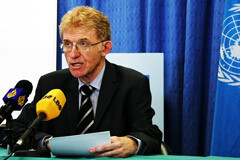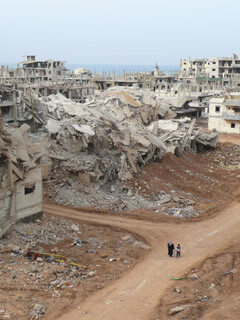Electronic Lebanon 23 June 2008
BEIRUT (IRIN) - One year on since the fighting between Islamist militant group Fatah al-Islam and the Lebanese army destroyed most of the northern Nahr al-Bared Palestinian refugee camp and displaced up to 40,000 of its residents, the pace of reconstruction remains grindingly slow.
The “old camp,” inside the official boundary, is mostly rubble and is the responsibility of the UN agency for Palestine refugees (UNRWA) to rebuild. In the larger adjacent areas, commonly known as the “new camp,” UNRWA has a limited remit to operate.
Some 2,000 families of the 5,553 displaced have now returned to accessible areas, mainly in the new camp, and most to rented accommodation or temporary shelters.
On 23 June in Vienna, UNRWA will be asking international donors for US$445m for the reconstruction and recovery of both old and new Nahr al-Bared camps, as well as neighboring Baddawi camp and the surrounding areas.
Ahead of the conference, IRIN spoke to Richard Cook, director of UNRWA affairs in Lebanon.
IRIN: You’re asking donors for $445 million. How is that money going to be spent?

Richard Cook, director of UNRWA affairs in Lebanon. (Hugh Macleod/IRIN)
Of the $445 million, around $282 million will be for UNRWA for reconstruction and recovery in the old camp. Around $80 million will be a cash fund for families in the new camp to help them pay for reconstruction. For this, UNRWA will act as a facilitator of the payments. A Palestinian committee will oversee the claims process, as well as a government auditor, but it is up to UNRWA to make the payments. They will be made in stages.
For example, if we have $30,000 to give a family, we will pay $10,000 and then monitor how it was spent before paying the next installment. The remainder of the $445 million will go on rehabilitating Baddawi camp and [addressing] the socio-economic impact of the conflict, both of which we are in charge of.
UNRWA is also launching our own separate funding appeal for relief and early recovery operations to provide funds for those still displaced, temporary accommodation, food and non-food items, medical and education needs. That totals $39.7 million and covers 1 Sept 2008 to 31 Sept 2009. But we’re launching that after the Vienna conference.
IRIN: It’s a year on since the fighting that destroyed Nahr al-Bared yet speaking to agencies operating in the new camp, no one seems to have a clear idea who is taking the lead in reconstruction efforts. Can you tell us what the situation is?
RC: The new camp is the responsibility of the Lebanese government. They are responsible for infrastructure and housing, but they have asked UNRWA to assist.
IRIN: But, for example, the International Committee of the Red Cross (ICRC) repaired the main water pipes in the new camp in March yet there was a delay of many weeks before those pipes were actually connected to homes. Was this because UNRWA is not able to undertake infrastructure work outside the official camp boundary? If so, how did you get around this?
RC: UNRWA has now connected the water pipes to individual houses in the new camp, working alongside partners Islamic Relief. We were able to do this because it is classified as an emergency response. The government is responsible for further rehabilitation, such as roads. But UNRWA is looking for an exit strategy as we can’t continue the emergency response indefinitely.

UNRWA estimates that up to 85 percent of Nahr al-Bared’s homes have been destroyed or rendered uninhabitable. (Lucy Fielder/IRIN)
RC: No NGOs [non-governmental organizations] came forward to say they have the capacity to do this. As far as I know, NRC has only worked with us in the camp on building a bridge over the river. We do our best to make temporary accommodation as livable as possible, but it’s not going to be like living at home.
People were desperate to get out of the conditions they were living in and so some of the units were built too quickly. The major problem we had was obtaining land as the neighboring communities saw them as potentially permanent camps on their doorstep.
We’re now using the more traditional method of cinder blocks, but these take longer to build. We are willing to work with anybody who can do the job better than UNRWA can. The question is: could what UNRWA has done be improved upon in the circumstances? Coordination can improve, but we’ve done a lot to bring in other agencies, such as the ILO [International Labour Organization], UNICEF [UN children’s agency], UNDP [UN Development Program], and UNHCR [UN refugees agency], who have all played an active role.
IRIN: Given the legal complexities involved and the fact that so many different agencies have a budget to work with Palestinians, why was OCHA [UN Office for the Coordination of Humanitarian Affairs] not involved in coordinating the reconstruction effort?
RC: OCHA in the past has played a very important role. We were asked in the immediate relief effort if we needed support and we said we didn’t. UNRWA is on the ground dealing with the population for whom we are responsible. UNRWA had the capacity to deal with it and we did deal with it. If we had felt there was an overriding benefit to do so, we would have asked OCHA for assistance.
IRIN: It’s clear UNRWA is caught in a murky legal framework when it undertakes projects outside official camp boundaries. The government has asked you to assist in the new camp, yet your remit doesn’t allow you to build what could be construed as permanent structures, such as cinder block shelters. Why not just ask the government for a new deal to expand the official boundary of Nahr al-Bared to include all areas of the camp in use by Palestinians?
RC: We raised the issue of expanded camp land several months ago and were told very emphatically by the prime minister that this was out of the question.
IRIN: Are you satisfied with the pace of reconstruction?
RC: I’m not satisfied with the pace of reconstruction so far. Clearing the rubble is taking much longer. The evaluation has only been completed in the past few weeks, after we were given access to the old camp. The rubble needs substantial demining and there’s lots of it. The army has made only a superficial sweep.
In our own compound there was an explosion as we began removing rubble this month. The UNDP is overseeing the rubble removal but it will take between eight to 12 months just to clear the unexploded ordnance.
IRIN: Other UN agencies and international NGOs highlight what they see as a gap in UNRWA’s mandate in terms of protection. They say that Palestinians are not having their rights protected because UNRWA doesn’t serve that function.
RC: Protection is broken down into military, legal, general and advocacy. In terms of general protection, UNRWA absolutely serves that function. UNRWA’s Gaza Refugee Affairs officer has a substantive protection mandate. It’s just not called that. We have been working with OHCHR [Office of the UN High Commissioner for Human Rights] on issues in Nahr al-Bared and this is the first time the two agencies have worked on a common issue like this.
For example, we know of 24 young people from Nahr al-Bared who are still in prison and we are following up with ICRC over this. We also ask the army to grant us and residents better access to the camp.
IRIN: Both the government and the Palestinian leadership say Nahr al-Bared will not return to the autonomous Palestinian security system that is in place in the other 11 camps across Lebanon, and stems from the Cairo Agreement of 1969. That’s a sea change in terms of Palestinian-Lebanese relations isn’t it?
RC: Yes, Nahr al-Bared will come under a community policing approach, using both Lebanese and Palestinian security forces. This has been voiced by both sides. The crisis of Nahr al-Bared has further solidified the relationship between the government and Palestinian leadership. Palestinians have made it clear they do not want those kinds of people [Fatah al-Islam] but they are concerned with their inability to deal with them.
We have seen a coming together of factions that wouldn’t otherwise have come together. This was an exceptional situation and I hope we never see it again. But there is now a door open, a new approach that would not have been considered realistic two or three years ago.
This item comes to you via IRIN, a UN humanitarian news and information service, but may not necessarily reflect the views of the United Nations or its agencies. All IRIN material may be reposted or reprinted free-of-charge; refer to the copyright page for conditions of use. IRIN is a project of the UN Office for the Coordination of Humanitarian Affairs.


